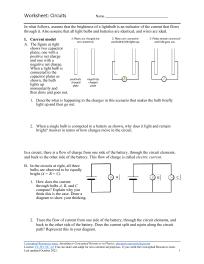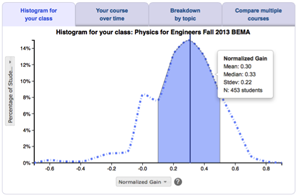
Developed by: Amy Robertson, Lisa Goodhew, Lauren Bauman, and Paula Heron

middle schoolhigh schoolintro collegeinter-mediateupper levelgrad school other

calc based

alg based

conceptual










Overview
What? Designed to help students build models and engage in sense-making about physics, often by asking students to recognize and appreciate their own good ideas as "seeds of science". Based on research identifying common productive student ideas.
Why? Focus on building students' productive ideas rather than confronting misconceptions, which can help build confidence and enjoyment. Free and open source. Instructor guides help you notice student ideas as they come up and decide what you might do next.
Why not? They require more skill to facilitate because students take their own paths towards building their own models, rather than being guided on a pre-determined path towards a particular model. Some students may be frustrated by the open-ended nature of activities and the lack of a satisfying conclusion.
Activity outline
Students engage in three main activities as they iteratively build a model they can use to explain and predict phenomena:
- Gather: Students respond to conceptual physics questions that research has shown to consistently elicit generative student ideas about specific physics topics (e.g., wave propagation, dc circuit behavior, collisions).
- Articulate: Students express their ideas more formally, often as a set of rules.
- Apply: Students apply and test their models for a phenomenon.
How to implement ACORN Tutorials:
- Use these tutorials in person or in synchronous online classes in a 50-90 minute period.
- Arrange for students to work on the worksheets collaboratively in groups of 3-4.
- Plan for intermittent but regular instructor engagement with every group: If possible, there should be one instructor for every 2-4 student groups. Near-peer facilitators (LAs or TAs) are helpful.
- Instructors should prepare for both the general approach taken by the worksheet and the specific worksheet questions in a preparation session that takes place before class.
- The worksheet should not be graded, so that students can explore a variety of ideas without feeling pressure to get the right answer.
Topic outline
Topics covered:
- Momentum
- Circuits
- Waves
- Heat and temperature
Student skills developed
- Conceptual understanding
- Problem-solving skills
- Using multiple representations
- Building models
Instructor effort required
- High
Resources required
- TAs / LAs
- Tables for group work
Resources
Teaching Materials
You can download the tutorials and instructor guides for free from the developers' website.
Research
This is the second highest level of research validation, corresponding to:
- at least 1 of the "based on" categories
- at least 2 of the "demonstrated to improve" categories
- at least 4 of the "studied using" categories
Research Validation Summary
Based on Research Into:
- theories of how students learn
- student ideas about specific topics
Demonstrated to Improve:
- conceptual understanding
- problem-solving skills
- lab skills
- beliefs and attitudes
- attendance
- retention of students
- success of underrepresented groups
- performance in subsequent classes
Studied using:
- cycle of research and redevelopment
- student interviews
- classroom observations
- analysis of written work
- research at multiple institutions
- research by multiple groups
- peer-reviewed publication
References
- Y. Abraham, M. Valentin, B. Hansen, L. Bauman, and A. Robertson, Exploring student conceptual resources about heat and temperature, presented at the Physics Education Research Conference 2021, Virtual Conference, 2021.
- A. Alesandrini, T. Huynh, L. Bauman, and A. Robertson, Identifying student resources for reasoning microscopically about heat and temperature, presented at the Physics Education Research Conference 2022, Grand Rapids, MI, 2022.
- L. Bauman, J. Corcoran, L. Goodhew, and A. Robertson, Identifying student conceptual resources for understanding electric current, presented at the Physics Education Research Conference 2020, Virtual Conference, 2020.
- L. Bauman, L. Goodhew, and A. Robertson, Students’ use of conceptual resources for understanding superposition, presented at the Physics Education Research Conference 2019, Provo, UT, 2019.
- L. Bauman, C. Mathis, S. McKagan, A. Madsen, K. Marvin, L. Goodhew, and A. Robertson, Centering physics faculty ideas about resources-oriented instruction, presented at the Physics Education Research Conference 2021, Virtual Conference, 2021.
- C. Broadfoot, B. Hansen, A. Robertson, and L. Goodhew, Identifying student resources for understanding kinematics, presented at the Physics Education Research Conference 2020, Virtual Conference, 2020.
- J. Geiger, L. Goodhew, and T. Odden, Developing a natural language processing approach for analyzing student ideas in calculus-based introductory physics, presented at the Physics Education Research Conference 2022, Grand Rapids, MI, 2022.
- L. Goodhew, A. Robertson, and P. Heron, A case of resources-oriented instruction in calculus-based introductory physics, presented at the Physics Education Research Conference 2020, Virtual Conference, 2020.
- L. Goodhew, A. Robertson, P. Heron, and R. Scherr, Student conceptual resources for understanding mechanical wave propagation, presented at the Physics Education Research Conference 2017, Cincinnati, OH, 2017.
- L. Goodhew, A. Robertson, P. Heron, and R. Scherr, Examining the productiveness of student resources in a problem-solving interview, presented at the Physics Education Research Conference 2018, Washington, DC, 2018.
- L. Goodhew, A. Robertson, P. Heron, and R. Scherr, Student conceptual resources for understanding mechanical wave propagation, Phys. Rev. Phys. Educ. Res. 15 (2), 020127 (2019).
- L. Goodhew, A. Robertson, P. Heron, and R. Scherr, Students' context-sensitive use of two kinds of conceptual resources for mechanical wave reflection, presented at the Physics Education Research Conference 2019, Provo, UT, 2019.
- L. Goodhew, A. Robertson, P. Heron, and R. Scherr, Students’ context-sensitive use of conceptual resources: A pattern across different styles of question about mechanical waves, Phys. Rev. Phys. Educ. Res. 17 (1), 010137 (2021).
- B. Hansen, L. Bauman, Y. Abraham, M. Valentin, and A. Robertson, Identifying student resources for understanding linear momentum, presented at the Physics Education Research Conference 2021, Virtual Conference, 2021.
- A. Robertson, L. Bauman, Y. Abraham, B. Hansen, H. Tran, and L. Goodhew, Resources-oriented instruction: What does it mean, and what might it look like?, Am. J. Phys. 90 (7), 529 (2022).
- A. Robertson, L. Goodhew, P. Heron, and R. Scherr, Pulses as not-objects: student responses to a new question about the superposition of mechanical waves, Phys. Educ. 54 (5), 055023 (2019).
- A. Robertson, L. Goodhew, P. Heron, and R. Scherr, Impetus-Force-Like Drawings May Be Less Common Than You Think, Phys. Teach. 60 (4), 254 (2022).
- A. Robertson, L. Goodhew, R. Scherr, and P. Heron, University Student Conceptual Resources for Understanding Forces, presented at the Physics Education Research Conference 2017, Cincinnati, OH, 2017.
- A. Robertson, L. Goodhew, R. Scherr, and P. Heron, University student conceptual resources for understanding forces, Phys. Rev. Phys. Educ. Res. 17 (1), 010121 (2021).
- A. Robertson, L. Goodhew, R. Scherr, and P. Heron, Impetus-Like Reasoning as Continuous with Newtonian Physics, Phys. Teach. 59 (3), 185 (2021).
- H. Sabo, L. Goodhew, and A. Robertson, University student conceptual resources for understanding energy, Phys. Rev. Phys. Educ. Res. 12 (1), 010126 (2016).





